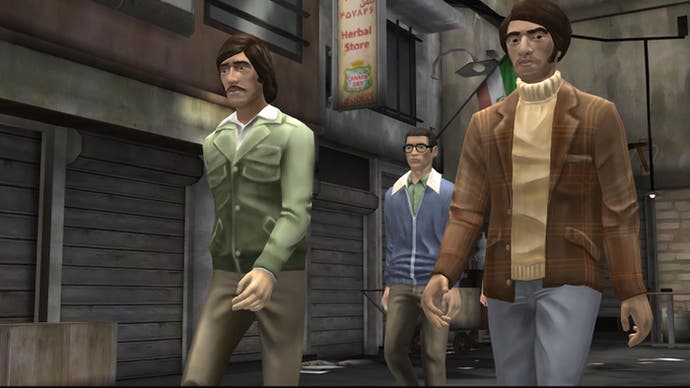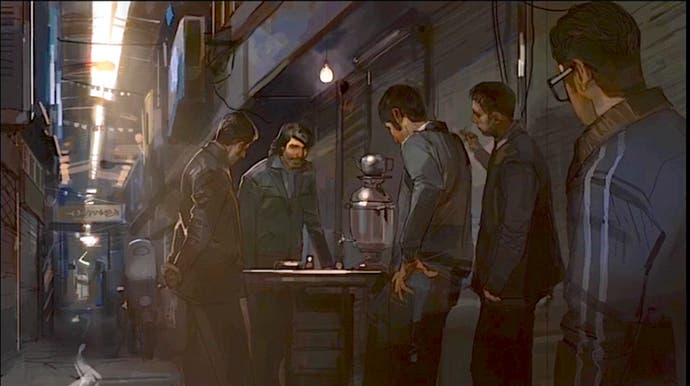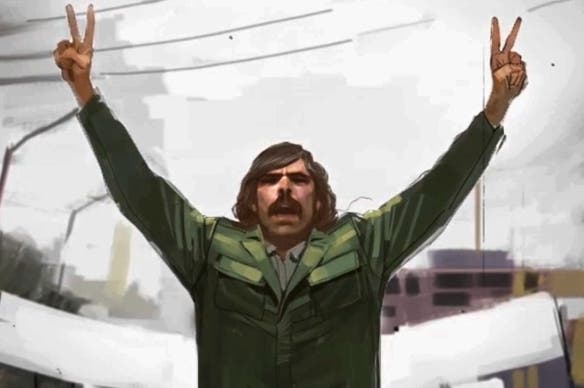Games for change: 1979 Revolution preview
An Iranian dev's ambitious adventure about its homeland's history.
Imagine waking up and checking Facebook. Maybe one of your friends points you to an interesting essay, fun survey, or cute cat video. For Navid Khonsari, he was linked to an article from his native Iran that branded him a spy.
And what did he do to incur the wrath of his homeland? Khonsari revealed that he was making a game about the 1979 Iranian revolution. Nevermind that his goal with the game was to tell both sides of the tumultuous conflict he grew up during.

Khonsari, a veteran game developer and movie producer who worked on Grand Theft Auto: San Andreas and the arm wrestling documentary Pulling John, first announced his upcoming project, 1979 Revolution, at a promotional event for a project his friends were working on - an app based on the graphic novel Operation Ajax.
"They asked me if I wanted to talk about the game during their presentation. So I got up there and spoke about it and it drew a lot of attention from people in the press who wanted to further find out about it," Khonsari says to me in an interview over Skype. "So I did an interview and when that interview went viral the conservative state-sponsored newspaper in Iran - which is actually kind of a conundrum because all state-sponsored stuff in Iran is conservative - basically just deemed me an American spy making propaganda based on the Iranian revolution."
This was outrageous to Khonsari, whose aim was to explore all angles of the ever mercurial political climate that came to a head in 1979 when Shah Mohammad Reza Pahlavi's "white revolution" was overthrown, only to be replaced by the Ayatollah Khomeini, the "supreme leader" of Iran during the following Islamic Revolution.
"When I did the interview my goal was to try to show both sides of what had taken place. In the interview I'd spoken about my respect of the spirituality of religion, and how my grandmothers both prayed and I respect the spirituality of that. Now things have somewhat changed in terms of how that spirituality has been interpreted by the present regime, but I didn't really say anything that made it look like I've got the Islamic republic in my crosshairs."
The news was quite the blow for Khonsari, who still has family in Iran. Fortunately, most of them are no longer there and he seems confident that his remaining extended family won't be hassled over their connection to him. All things considered, it could have been a lot worse - as it was for other Iranian members of his development team, Ink Stories, who've had to work in anonymity for their own safety and the safety of their families. "Most of them have now left and are living abroad, but are remaining anonymous because they don't want their family members who are in Iran to get in trouble," Khonsari tells me. "You're talking about a judicial system where people are getting arrested on whims and allegations."
It sounds pretty brutal. Taken at face value this situation does little to diminish the west's perception of Iran as a place where white soldiers kill evil brown people in first-person shooters and watch Ben Affleck rescue people from. But Iran isn't the bullish, oppressive state recent news headlines would suggest - even if those in power have less than progressive attitudes towards free speech -and back in the late 70s, it had even less in common with the Islamic regime it's known for today.
"Most people automatically assume that Iranians wanted the Islamic Republic," Khonsari tells me, but that's not the case at all. "Iranians are the least religious people in that entire region," he explains. The reality of the situation is often obscured by the media, but Kohnsari, who spent his formative years in Iran before emigrating to the US as a teenager, aims for 1979 Revolution to show firsthand what 1979 Iran was really like.
"I want to provide that 'oh wow, I didn't know that!' [reaction] to the game experience," Khonsari says. "It could be a mere part of you walking through the streets and saying 's** man, this looks just like Brooklyn in the 1970s!' Or 'aw man, that girl's not covered up. Is she wearing a tank top? Wow, I didn't know they could do that!' Or 'That girl's the head of the revolutionary squad?' Or 'Are those two guys actually having an argument about what's better: heavy metal or disco?' These things might seem futile, but they create a fabric. That fabric might be in the background, but I guarantee that it will have an impact on how people start seeing things."
While Iran is far from home to most of us, the struggles of its people during this time were something we could all relate to. "A big part of my objective with this is to kind of show the similarity with the revolution [to modern times]," Khonsari tells me. "The foundation of why this revolution came about was because of the fact that people wanted a sense of economic and social equality. A true democracy where their votes counted. And they fight for that even today. These are things that everybody wants."
Despite Khonsari's background in film, he feels that he can tell the story of the Iranian Revolution better by letting players experience it for themselves. "The greatest thing about video games is that it's not a one and a half hour movie which you watch," Khonsari says. "What's more interesting about this history is it contains where these crucial events took place but you get to experience the journey of these people who lived throughout this time."
In other words, knowing the story and experiencing the story are two completely different things. The former feels like an abstraction with a newspaper article, documentary, or feature film keeping the viewer/reader at arm's length from what going through what the situation is actually like. "The holocaust was the holocaust. We know that it's a tragedy and these events took place, but what really resonates with us is what we understand from the experiences of the people, the stories of the people," Khonsari explains. "And I felt like one step further would be to put you in the shoes of those people who've experienced that."

"Generations of people around the world only know of Iran as women covered in veils and men covered as clerics. I wanted to engage people to truly experience what was happening in Iran and how things changed. How things were kind of hijacked from the passionate pleas of people to to the Islamic Republic's revolution," Khonsari continues.
As such, Khonsari is concerned with getting the details right. While 1979 Revolution will have a significant stealth and action component - both to keep things entertaining and capture the anxious feelings of danger and excitement that comes with a riot - this won't simply be a shooter with a bunch of historical facts filling in the seams. Instead, Khonsari aims to capture the minutia of overthrowing a regime through protests in a country where guns are outlawed for civilians. Sure, you'll be able to illicitly acquire weapons and ammo, but you'll also need to bring such resourceful everyday equipment as lemons and pens.
Yes, lemons! You see, a common tactic to combat tear gas is squeezing a lemon into a cloth, then inhaling its citrus-filled fumes to clear your eyes. Google it. It's actually a thing. Khonsari is still sorting how to implement the combat, but hypothesised that dropping your lemon while engulfed in tear gas could really get players engaged in a completely believable situation. As they say, when life give you lemons, make a jerry-rigged temporary gas mask.
And the pen? These were used for on the field tracheotomies. An incision would be made around the adam's apple if something was obstructing one's throat or there was excess swelling. And this wasn't one of those once in a blue moon 127 Hours-like situations either, but a common practice in the war-torn streets or Iran around this time. "My father was a doctor and during the time of the revolution he spent endless days and even overnights attending to people in the streets as a physician," Khonsari tells me. "It had just a huge impact on him because he wasn't used to seeing that kind of trauma."
As for the rest of the game, Khonsari likens it to The Walking Dead meets the missions in Grand Theft Auto, though it won't be an open-world game. "You get to make choices that will redirect the story to a certain degree," Khonsari says. "It'll have elements of stealth. It'll have challenges ranging from throwing stones at soldiers, to taking pictures, to trauma, to helping citizens who've been shot and injured, to smaller challenges like [painting] graffiti and navigating crowds. And obviously the dialogue element to it really pushes the story aspect and allows you to try everything from lying or being honest to making hard decisions about who you will support during these very, very tumultuous political times."
The developer adds that players are "going to get a richer story than they've ever experienced in an action adventure game. And they're going to be able to engage with a game that will not only suck them in emotionally, but they'll actually be a part of something that was real. And they're going to be able to have collectibles and interactions with real articles. Whether it's pictures that were taken during that time or recordings that were used as forms of propaganda. And also they're going to be able to learn what people do in revolutions as pedestrians against soldiers in order to survive when tear gas is thrown."
In many ways, 1979 Revolution will echo Telltale's the Walking Dead with its focus on choices, character drama, and a malleable, yet authored narrative, but Khonsari argues that Telltale's latest format could be even more engaging with a greater degree of real-time action punctuating the proceedings. "There's this impending threat all the time," Khonsari says of The Walking Dead's premise. "But I believe that those emotional highs and lows could have been even stronger if that impending threat was a lot more realistic and you knew that through action sequences you could actually be taken out. I never felt the threat of the zombies. The choices were choices against my fellow survivors, but I never ever felt like I might get chomped on by a zombie." As such, 1979 Revolution will be a little less talky and a little more shooty and stealty, but Khonsari estimates the action components will only comprise about 40 per cent of the experience - which sounds about halfway between The Walking Dead and last year's most grounded action/adventure The Last of Us.
There is one other aspect in which 1979 Revolution will follow in Telltale's footsteps: its episodic format. Ink Stories has planned a three season arc for the game with each season consisting of three roughly two-hour episodes each.
Season One will follow the exploits of a young, initially apolitical college student who gets swept up in the spirit of the revolution only to come face to face with the brutal reality of toppling a regime. "He's a photographer and he wants to be in the heat of things," Khonsari explains. "As situations progress and become dark, he loses people very, very close to him and that becomes the catalyst for him taking up the cause. It's about his own personal growth at this point as he goes from fighting for revenge to actually becoming a political revolutionary to eventually becoming a hero of the revolution. And then finally going from being a hero of the revolution to a member of the opposition when the Islamic Republic is put into place and he becomes as enemy of the state - which is pretty much the story of all political parties that existed in Iran prior to the Islamic Republic and then after the Islamic Republic."
Of course, back then no one knew that the topping of the Shah's regime would result in the Ayatollah Khomeini coming to power. "You fight one regime only to see the new regime that comes into power regard you as not an ally but an enemy," Khonsari explains.
By casting the player as a fesh faced college kid, Ink Stories aims to capture that schism of youthful idealism butting heads with the grim political machinations of reality. "I think all of us at some point in our life have that revolutionary spirit in us," Khonsari says. "That revolutionary spirit has to come to that realisation that there are consequences. I think when you're young and you want to relate to people who believe in an indestructible belief, and the power of passion, and don't necessarily have the foresight or the foreshadowing that things can go horribly wrong."

Season Two will switch perspectives to that of an Iranian-born US soldier posing as an Iranian citizen during operation Eagle Claw - a real incident centered around rescuing US hostages. In real life the rescue choppers crashed into each other leaving the mission aborted and the undercover rescue drivers stranded on the ground. You'll play as one of these drivers trying to flee the country.
The final season's premise is a bit spoiler, so skip ahead to the next paragraph if you don't want to know. Season Three will let you choose between the leads of Seasons One and Two. Both will be stuck in the same prison in Tehran during the Iran / Iraq war and you'll role play as one of them trying to escape from Iran.
Ink Stories' historical saga is quite the undertaking for a team of nine people with another 10 freelance contributors helping out, which has led some to wonder how the project will be financed after its Kickstarter failed and a newer long-term crowdfunding campaign launched to little fanfare. But Khonsari isn't worried about this and says he's in talks with various investors and publishers about finishing 1979's production.
Despite not actually meeting its funding goal, Khonsari still considers the 1979 Kickstarter a success in how it brought attention to the project. "I don't care about having a successful Kickstarter. I care about having a successful game," Khonsari says. "Those who have supported us have not only given us money but are out there pushing us and pushing the product and interacting with us; asking how they can help, getting the word amongst their friends, amongst their colleagues. So Kickstarter helped us kickstart a community and that was the most important thing for me."
The Kickstarter campaign also gave Ink Stories plenty of feedback; enough to warrant one major addition: PC and Mac versions. 1979 Revolution was originally conceived as an iOs and Android affair, but the community's desire for a home computer version was too strong to ignore. "The greatest lesson that we learned from Kickstarter was the power of the PC. So we're definitely going to be moving a SKU onto PC," Khonsari explains. He notes that it may even show up on a console or two, but there's nothing yet official on this front.
For how many games are set during World War 2, it's embarrassing that so few actually aim to portray perhaps the 21st century's most defining conflict as anything but a battlefield to run around popping Nazi skulls in. Iran's 1979 revolution is less well known, but no less interesting and it's just as current today as it was 35 years ago. The very fact that Iran's present Islamic regime wants to silence it is proof enough of that.
"I personally believe that we're on the cusp of being able to have an impact on the world with gameplay," Khonsari says. "It's not an easy kind of soapbox to stand on and to preach, but if you can provide that, it can entertain people and engage them within a real experience. You can go so much further than anything else that's been done prior to this present moment in terms of gaming."





